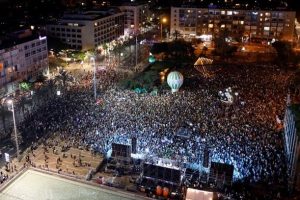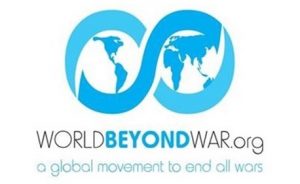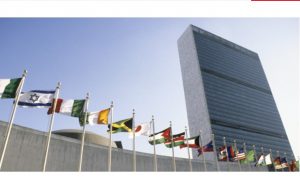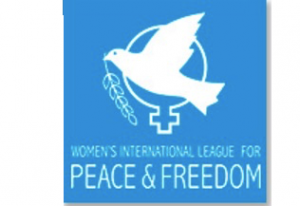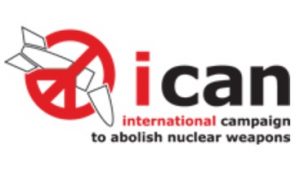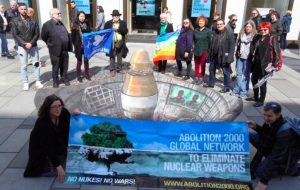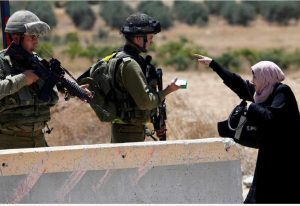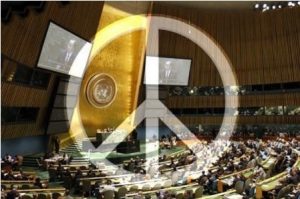DISARMAMENT & SECURITY .
An article by Chris Nineham for Stop the War Coalition
Theresa May’s humiliating failure to gain a majority in the General Election is a great boost to everyone who opposes foreign wars. May is an enthusiast for the ‘War on Terror’ and has been one of the political world’s keenest supporters of Trump’s deranged foreign policy since day one. She very publicly backed his provocative attacks on Assad’s forces in April and, during the election period, she threatened to follow up with a British escalation against the Syrian regime if she got a majority.
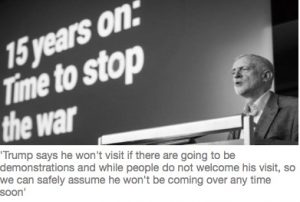
(Click on image to enlarge)
Given her dreadful election result a May-led government, if it gets off the ground at all, is likely to be way too weak to pursue any more foreign wars. She may try to do so using her unholy alliance with the DUP, but her fatal weakness makes this much easier to oppose. What is more, the fact that Trump has been forced to call off his planned visit in October for fear of demonstrations is an unprecedented blow against the special relationship as well as being more proof that protests work. Trump says he won’t visit if there are going to be demonstrations and while people do not welcome his visit, so we can safely assume he won’t be coming over any time soon.
This is more than a matter of movement self-congratulation. Britain has been the US’s key political and military ally throughout the ‘War on Terror’. The removal of Britain at least as a public champion of the US is a big foreign policy setback for a regime whose serial aggressions are isolating it further and further on the world stage.
But there is more heartening news to be extracted from the experience of the election. First, the concerted attack on Jeremy Corbyn over his refusal to promise to ‘press the nuclear button’ failed to make an obvious difference to the election campaign, despite the fact that an ambush was staged against him on the high-profile Question Time ten days before the election.
(Article continued in right column)
How can the peace movement become stronger and more effective?
(Article continued from left column)
Reeling from her manifesto blunders, it was felt by some that the two appalling terrorist attacks in the election campaign would allow Theresa May to play the security card and re-establish her ‘strong and stable’ credentials but this was clearly not the case. In the days after the attacks the media went on a co-ordinated rampage against Corbyn’s record on war and peace. The day before the election the Sun led with a so-called expose on ‘Jezza’s Jihadi Comrades’, the Telegraph claimed ‘Corbyn Ducks Terror Challenge’ and the BBC obediently followed suit with a photomontage of Jeremy Corbyn next to Osama Bin-Laden.
All this appears to have failed to make much of an impact on the general public. The surge to Labour continued right up until election day and beyond. Jeremy Corbyn had responded to the dreadful attack in Manchester by calling a press conference at which he explicitly argued that Western foreign policy has been one of the drivers of the spread of terrorist attacks and organisation. Despite the media onslaught an opinion poll taken days after showed that the overwhelming majority of the population agreed with him. The ORB survey found 75 per cent of people believe interventions in Iraq, Afghanistan and Libya have made atrocities on UK soil more likely. Even 68% of Tory voters agreed.
This underlines the growing sense that despite the fact that 70% of the newspapers backing the Tories, the print media is losing what ability it ever had to shape popular opinion. Partly no doubt it was a product of the novelty of a party leader breaking the taboo on discussing the causes of terrorism and putting a coherent and clear argument against the record of the War on Terror. But partly it revealed something deeper.
Despite the failure of the media to engage in a real debate, despite the refusal of the establishment to accept the findings of the Chilcot report and at least four parliamentary investigations into the wars that we have been dragged into, popular opposition to foreign aggression has only deepened over the years. A largely unreported YouGov poll which came out during the election campaign showed that between 43% and 55% of the population disapproved of the wars in Afghanistan, Iraq and Libya with less than 25% in favour and that more people opposed than supported even the first Gulf war in 1991.
All this is important for a number of reasons. It is a reminder that we mustn’t make the mistake of reading public opinion off from the people who claim to be opinion formers in British society almost all of whom regard criticism of Britain’s war record as being beyond the pale. It tells us too that those siren voices in the Labour Party who believe that anti war policies are too radical for the British electorate are plain wrong.
It indicates in fact that it is now time to launch a concerted campaign for a fundamentally new foreign policy. Such a new direction is a necessary counter to the right wing vision of a world of more security, surveillance and international retribution.
